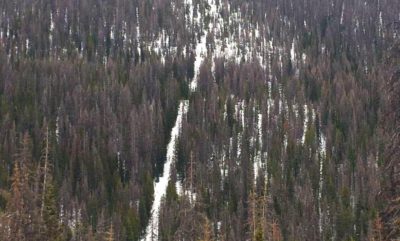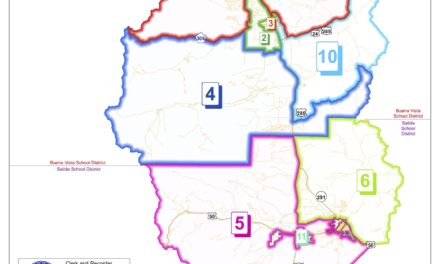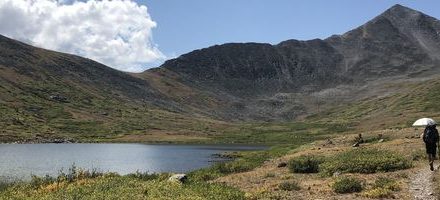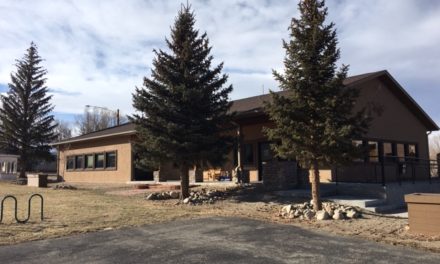
Dead and dying spruce trees dominate the forest near Monarch Pass. The U.S. Forest Service and its partners are working to minimize fire risk and protect local water resources through the Monarch Pass Forest and Watershed Health Project (courtesy photo).
The Upper Arkansas Water Conservancy District has secured a $400,000 grant from the Colorado Water Conservation Board to support the Monarch Pass Forest and Watershed Health Project.
Chelsey Nutter, projects manager with the Upper Ark district, reported the grant award at the October meeting of the district board of directors.
Led by the U.S Forest Service, the Monarch Pass project is addressing the spruce-beetle infestation and subsequent die-off of trees in the Monarch Pass area. The initial phase addressed beetle-kill timber at Monarch Mountain resort and included financial support from the resort.
The CWCB grant will support the second phase of the project, which will remove dead timber from the slopes opposite the ski resort along Monarch Pass.
Project Manager Alex Rudney, U.S. Forest Service silviculturist, said, “The slopes across from the ski area are very steep, and the ability to do vegetation management in Colorado is very limited and very expensive on steep slopes.”
Rudney said slopes greater than 40 percent constitute about 600 acres of the project area on the south side of U.S. Highway 50. “Once you’re on slopes greater than 40 percent, ground-based equipment causes resource damage,” especially when tires begin to spin and dig into the soil.
The plan for this area is to use new “steep-slope cut-to-length logging” equipment. Designed to operate on slopes up to 70 percent, this innovative equipment uses tracks and a winch tethered to the top of the treatment area.
Rudney expressed a sense of urgency in moving this project forward, given the 90-percent mortality rate of mature spruce trees in the area, but this steep-slope logging equipment is not currently available in Colorado.
“This is a demonstration project, and there’s some cost associated with it,” said Rudney, because equipment and operators would have to be brought in from the West Coast.
The CWCB grant provides a significant boost to the project, thanks in large part to the efforts of Chelsey Nutter on behalf of the Upper Ark conservancy district.
Nutter negotiated more than $200,000 in matching funds from multiple partners in order to secure the CWCB grant, providing more than $600,000 in support of the $1.5 million project.
Project partners include the Arkansas River Watershed Collaborative, Trout Unlimited, Colorado Springs Utilities, Pueblo Board of Waterworks, Chaffee County, the city of Salida, the town of Buena Vista and the town of Poncha Springs.
During Nutter’s report to the conservancy district board, Nutter said the project has provided an example at the state level for how to secure CWCB funding by emphasizing the watershed health component of proposed projects.
With funding for the project now in place, Nutter said the hope is that the next phase of the project will begin in the spring of 2019.
For more coverage of this project: arkvalleyvoice.com/forest-service-works-to-reduce-fire-risk-protect-water-resources/











Recent Comments